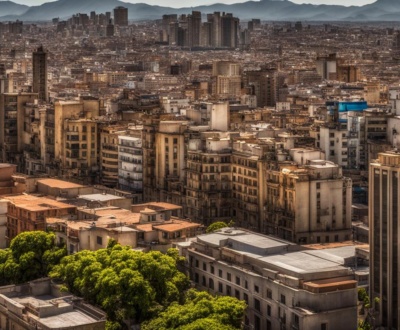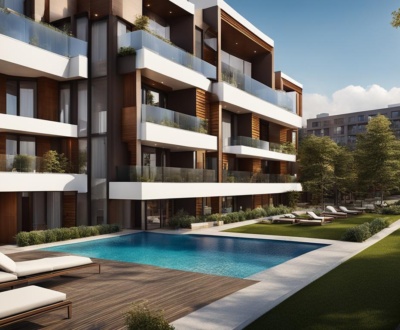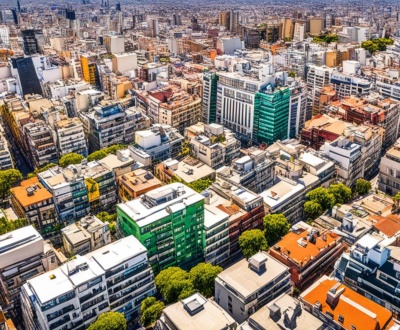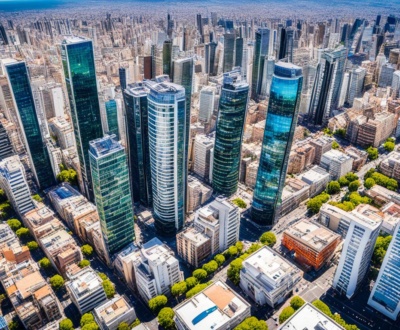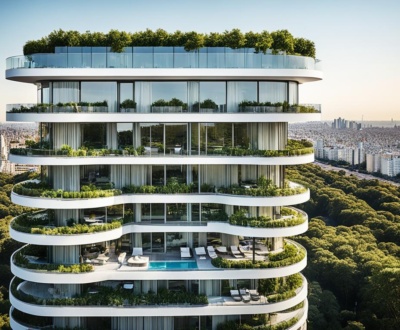Welcome to our comprehensive guide on property valuation and insights in Argentina. Whether you are an investor, homeowner, or industry stakeholder, this article will provide you with valuable information about the real estate landscape in Argentina, including luxury apartments, high-end rentals, and exclusive accommodations.
Argentina’s real estate market is known for its upscale properties, particularly in major cities like Buenos Aires. With a focus on luxury living and high-quality rentals, there are plenty of opportunities for those seeking luxury real estate in Argentina. The market offers a range of options, from luxury apartments to upscale properties in Buenos Aires and beyond.
In this guide, we will explore Argentina’s real estate returns, the availability of luxury apartments, and the current market trends. Whether you are looking to invest in Argentina’s real estate market or find exclusive accommodations for your next stay, this guide will provide you with the insights you need to make informed decisions.
Argentina’s Economic Outlook and Forecast
In examining the real estate market in Argentina, it is crucial to understand the country’s economic outlook and forecast. The economy in Argentina has a history of volatility, which can significantly impact the real estate sector. Key factors to consider when forecasting the country’s economy include inflation rates, government policies, and global economic trends.
Argentina’s real estate market has often served as a hedge against inflation and economic instability, making it an attractive investment option during uncertain times. The use of the U.S. dollar for high-value transactions, including real estate, is common due to a lack of trust in the local currency.
Cities like Buenos Aires, Córdoba, and Rosario have traditionally experienced rapid growth due to their economic activities. However, emerging trends in suburban and rural areas, especially with the rise of remote work, could gradually divert attention away from the traditional urban centers.
Although Argentina’s economic forecast may be more volatile compared to neighboring countries, its larger market size offers significant growth opportunities. Government policies in 2024 may focus on housing affordability, foreign investment regulations, and taxation related to real estate transactions. Improvements in foreign investment, a stable global economy, and successful government policies have the potential to positively impact the real estate market by boosting confidence and increasing purchasing power.
However, it is important to consider the risks associated with economic instability, currency devaluation, and political uncertainty before making any investment decisions in Argentina real estate.
Prospective Economic Factors:
- Inflation rates
- Government policies
- Global economic trends
Opportunities and Risks:
Opportunities:
- Potential growth due to economic resurgence
- Increased confidence and purchasing power
Risks:
- Economic instability
- Currency devaluation
- Political uncertainty
| Economic Factors | Opportunities | Risks |
|---|---|---|
| Inflation rates | Potential growth due to economic resurgence | Economic instability |
| Government policies | Increased confidence and purchasing power | Currency devaluation |
Argentina Housing Prices
The trend in real estate prices in Argentina over the past few years has been influenced significantly by the country’s economic context. During economic crises, real estate prices have shown initial stability due to properties being priced in U.S. dollars, but prolonged economic difficulties have led to a slowdown in the market. When comparing current real estate prices with those from a decade ago, it’s important to consider the impact of inflation and currency fluctuations. While nominal prices might appear higher, adjusted for inflation and currency devaluation, real property values may not have increased significantly and might have even decreased.
The current trend in real estate prices in Argentina varies by region, with some areas experiencing rising prices while others remain stable or decline. Major cities like Buenos Aires have often experienced higher growth in real estate prices, driven by demand from both local and international buyers. Rural areas generally have lower property values except in cases near tourist attractions or lifestyle properties. Urban areas, especially major cities, have higher property values due to higher demand and better infrastructure.
The legal framework surrounding real estate investment in Argentina is a mix of stability and complexity, with frequent changes in laws and regulations. It’s crucial for investors, especially foreign ones, to seek local legal advice to navigate the market’s complexities before making any investment decisions.
| Region | Real Estate Prices |
|---|---|
| Buenos Aires | High growth driven by demand from local and international buyers |
| Rural Areas | Generally lower property values except in cases near tourist attractions or lifestyle properties |
| Urban Areas | Higher property values due to higher demand and better infrastructure |
When considering investing in Argentina real estate, it’s important to carefully assess the risks associated with economic instability, currency devaluation, and political uncertainty. Thorough market research, compliance with legal regulations, and consultation with local experts are essential for making informed investment decisions.
Argentina Real Estate Market Transformation
The real estate market in Argentina has undergone significant transformations in recent years, driven by economic stability, government reforms, and strategic initiatives. These factors have contributed to the growth and increased investor confidence in the sector.
Major cities like Buenos Aires, Cordoba, and Rosario have played a vital role in shaping the real estate landscape through urban development projects. These projects have led to the expansion of both residential and commercial properties, catering to the growing demand in these metropolitan areas.
Foreign investments have also played a significant role in the market’s expansion, attracted by legislative reforms and attractive opportunities. The influx of foreign capital has further fueled the growth of luxury real estate in Argentina, creating a thriving market for Argentina Luxury Apartments.
The residential real estate market in Argentina has been driven by the increasing demand for housing, fueled by urbanization trends and population influx into major cities. This has led to a significant focus on developing luxury properties in Buenos Aires and other metropolitan areas, catering to the upscale living demands of the population.
Commercial real estate, especially in central business districts, has experienced robust growth. The expansion of office spaces, retail outlets, and hospitality establishments has attracted both businesses and investors, contributing to the transformation of the market.
Technological integration has been a key driver of growth and innovation in the Argentina real estate market. Smart home systems and sustainable architecture have revolutionized the sector, making luxury real estate in Argentina even more appealing to investors and buyers seeking modern and eco-friendly living options.

These advancements, along with sustainability initiatives and regulatory reforms, have helped shape the Argentina real estate market and position it as an attractive destination for luxury real estate investment. The market offers a wide range of opportunities for those looking to invest in high-end rentals and luxury properties in Argentina.
Challenges and Opportunities in Argentina Real Estate
The real estate sector in Argentina faces several challenges and opportunities. Ensuring a stable regulatory environment is crucial for sustaining market growth and investor confidence. Continual adaptations in regulations and policies to promote transparency are pivotal for the sector’s stability. Embracing sustainability initiatives and fostering innovation in real estate practices presents opportunities for growth. Implementing green technologies, eco-friendly designs, and sustainable construction materials align with global environmental goals.
“Sustainability is not just a buzzword in the real estate industry, it’s an essential aspect of future-proofing our properties and creating a more environmentally conscious society.” – María González, Environmental Architect
Addressing infrastructure gaps and improving accessibility through transportation networks are essential for enhancing property values and attracting investments, especially in emerging regions. Governmental initiatives and policies, such as incentives, tax reforms, and regulatory measures, encourage investments and foster market stability.
Fostering Sustainable Development
- Implementing green technologies and renewable energy sources
- Encouraging eco-friendly construction and design
- Adopting sustainable building materials and practices
Infrastructure Development
- Investing in transportation networks and improving connectivity
- Upgrading utilities and expanding access to basic services
- Enhancing urban planning to support sustainable growth
Government Initiatives and Policies
- Providing incentives and tax benefits for real estate investments
- Streamlining regulations to promote transparency and efficiency
- Supporting affordable housing programs and first-time homebuyers
The thriving tourism industry in Argentina contributes significantly to the demand for hospitality and leisure properties, bolstering the real estate market. Emerging trends, such as co-living spaces and co-working environments, present opportunities for innovative real estate concepts. The integration of property technology solutions enhances buyer experiences and transaction efficiency.
By addressing key challenges and capitalizing on emerging opportunities, the Argentina real estate market can thrive, providing luxury living options and attractive returns for investors.
Outlook for Argentina Real Estate Market
The trajectory of Argentina’s real estate market is poised for continued expansion and innovation. The projected compound annual growth rate (CAGR) of 3.8% during 2023-2028 indicates sustained growth potential within the sector. Embracing technological advancements, sustainability practices, and regulatory reforms will be instrumental in shaping a robust and resilient real estate landscape in Argentina.
The market’s positive outlook is supported by economic resurgence, urbanization trends, and the influx of foreign investments. Argentina’s real estate market is becoming increasingly competitive, with many homes receiving multiple offers. The average homes sell for about 1% above list price and go pending in around 7 days. Hot homes can sell for about 3% above list price and go pending in around 4 days. The market is fueled by factors such as housing demand, commercial property developments, and the integration of property technology solutions.
Challenges and opportunities lie in maintaining a stable regulatory framework, embracing sustainability initiatives, and addressing infrastructure gaps. The government’s focus on incentives, tax reforms, and regulatory measures positively impacts market growth. The thriving tourism industry contributes to the demand for hospitality and leisure properties. The emerging trends of co-living and co-working spaces present opportunities for innovative real estate concepts.
| Factors | Trends |
|---|---|
| Housing demand | High, with many homes receiving multiple offers |
| Commercial property developments | Robust growth, particularly in central business districts |
| Property technology solutions | Integration of advanced technologies for enhanced buyer experiences |
| Maintaining a stable regulatory framework | Government focus on incentives, tax reforms, and regulatory measures |
| Sustainability initiatives | Embracing green technologies and eco-friendly designs |
| Infrastructure improvements | Addressing transportation networks and accessibility |
| Thriving tourism industry | Demand for hospitality and leisure properties |
Argentina Real Estate Market Comparison
When comparing the Argentina real estate market to other locations, it’s important to consider various factors such as housing prices, market competitiveness, and growth potential. Argentina’s real estate prices have been influenced by the country’s economic context, leading to variations in different regions. Major cities like Buenos Aires have experienced higher growth in real estate prices compared to rural areas.
The market in Argentina is becoming increasingly competitive, with many homes receiving multiple offers. The average homes sell for about 1% above list price and go pending in around 7 days. Hot homes can sell for about 3% above list price and go pending in around 4 days. These statistics reflect the strong demand for properties in Argentina’s real estate market.
Foreign investors are attracted to the Argentina real estate market due to legislative reforms and attractive investment opportunities. However, it’s important to carefully consider the risks associated with economic instability, currency devaluation, and political uncertainty when making investment decisions.
Comparative real estate markets like Chile or Uruguay may offer more stability, but they have smaller market sizes. Argentina’s larger market size, along with incentives, tax reforms, and regulatory measures implemented by the government, positively impacts the growth and stability of the real estate market.
The thriving tourism industry in Argentina also contributes to the demand for hospitality and leisure properties, making it an appealing market for luxury living and rentals.
| Factors | Argentina Real Estate Market | Comparative Real Estate Markets |
|---|---|---|
| Housing Prices | Influenced by economic context with variations by region | Varies based on specific location and economic factors |
| Market Competitiveness | Increasingly competitive with multiple offers on properties | Varies depending on the market size and demand |
| Growth Potential | Government incentives and reforms positively impact growth | Varies based on individual market conditions and economic stability |
While each market has its unique opportunities and challenges, Argentina offers a larger market size and a range of investment incentives. It’s essential for investors to thoroughly analyze the market and consider their risk tolerance and investment goals before entering the Argentina real estate market. By understanding the market dynamics and seeking guidance from local real estate professionals, investors can make informed decisions and capitalize on the opportunities available in Argentina’s real estate market.
Investing in Argentina Real Estate
Investing in Argentina real estate requires a comprehensive understanding of the market and its unique factors. The country’s history of economic fluctuations and currency devaluation should be carefully considered before making any investment decisions. While Argentina has traditionally been viewed as a safe haven for real estate investment, there are risks associated with economic instability and political uncertainty.
It’s important to have a thorough understanding of the legal framework surrounding real estate investment in Argentina. Seeking local legal advice can help navigate the complexities of the market and ensure compliance with regulations.
“Investing in Argentina real estate can offer significant opportunities for growth, but it’s important to carefully assess the risks and conduct thorough due diligence.”
Foreign investors can take advantage of specific incentives, such as the absence of restrictions on property ownership by non-residents and the potential for high rental yields in major cities. However, the complex bureaucratic processes for property transactions should be taken into account.
Conducting thorough market research, including analyzing housing prices, rental yields, and market trends, is essential for making informed investment decisions. Additionally, having a reliable network of local professionals and advisors can provide valuable insights and guidance.
- Key Considerations:
| Considerations | Action |
|---|---|
| 1. Understand the Economic Landscape | Closely monitor economic indicators and forecasts to assess the stability and growth potential of the real estate market. |
| 2. Local Legal Advice | Engage the services of a reliable local lawyer or legal expert who specializes in real estate to navigate the legal framework. |
| 3. Research Market Trends | Analyze historical and current market data to identify emerging trends and potential investment opportunities. |
| 4. Evaluate Property Prices | Compare property prices in different regions to determine the best value for your investment. |
| 5. Assess Rental Yields | Consider the potential rental income in relation to the purchase price to gauge the profitability of the investment. |
| 6. Networking | Build a reliable network of local professionals, including real estate agents, property managers, and tax consultants. |
Overall, investing in Argentina real estate can offer significant opportunities for growth, particularly in luxury properties in Buenos Aires. However, it’s crucial to carefully assess the risks, conduct thorough due diligence, and seek expert advice to make informed investment decisions.
Top Real Estate Markets in Argentina
Argentina offers several top real estate markets that attract both local and international investors. Major cities like Buenos Aires, Córdoba, and Mendoza are particularly sought after for their vibrant real estate markets. These cities offer a mix of residential and commercial properties, catering to a diverse range of investor preferences.
“Buenos Aires is a popular destination for luxury apartments and high-end rentals. The city’s cosmopolitan lifestyle, cultural attractions, and robust economic activities contribute to its appeal.”
Córdoba, known as Argentina’s second-largest city, offers a mix of historical charm and modern amenities. The city’s real estate market is driven by demand for upscale apartments and high-quality living options.
Mendoza, famous for its wine production, has also emerged as a desirable real estate market. The city offers a combination of natural beauty, vineyard properties, and luxury accommodations.
These top real estate markets in Argentina present opportunities for both residential and commercial investments. However, it’s important to consider factors such as market trends, housing prices, and rental yields when evaluating investment opportunities in each specific market.

Real Estate Market Comparison
For a comprehensive analysis of the real estate markets in Argentina, Chile, and Uruguay, refer to the table below:
| Market | Argentina | Chile | Uruguay |
|---|---|---|---|
| Property Prices | Varies by region; higher growth in major cities like Buenos Aires | Stable growth; higher prices in urban areas | Stable growth; higher prices in coastal regions |
| Market Competitiveness | Increasingly competitive with multiple offers on homes | Competitive market with good investment potential | Growing competitiveness with interest from international buyers |
| Growth Potential | Positive outlook supported by economic resurgence and foreign investments | Stable market with potential for steady growth | Growing market with opportunities for investment |
While Argentina offers a larger market size and attractive investment opportunities, Chile and Uruguay provide more stability in terms of economic conditions. The decision to invest in Argentina’s real estate market should be based on individual risk assessment and investment goals.
Legal Considerations in Argentina Real Estate
Investing in Argentina real estate involves navigating a unique legal framework. While property rights are generally well-respected in Argentina, there can be complexities and frequent changes in laws and regulations. It’s important for investors, especially foreign ones, to seek local legal advice to ensure compliance and minimize risks.
Understanding Property Ownership Regulations
Non-residents are generally allowed to own property in Argentina without restrictions, which is an attractive incentive for foreign investors. However, there are legal requirements and processes that need to be followed for property transactions. It’s crucial to have a clear understanding of the regulations surrounding property ownership to avoid any legal complications.
Tax Considerations in Argentina Real Estate
Taxes related to real estate transactions, such as property transfer taxes and income taxes on rental income, should be thoroughly understood and accounted for. It’s essential to consult with tax advisors or experts to ensure compliance with tax regulations and to optimize tax planning strategies.
Compliance with Anti-Money Laundering Regulations
Maintaining compliance with anti-money laundering regulations is of utmost importance. Argentina has implemented strict measures to prevent money laundering and illicit financial activities. Investors should be aware of these regulations and take the necessary steps to ensure compliance.
Staying Updated on Regulatory Changes
Due to the evolving nature of the legal framework, staying updated on regulatory changes is essential. Laws and regulations related to real estate can change frequently, and investors should regularly consult with local legal experts to stay informed and navigate any legal changes or updates.
Consultation with Local Legal Experts
Seeking local legal advice is crucial for investors, especially foreign ones, to ensure a smooth and legally compliant real estate investment process in Argentina. Local legal experts can provide valuable insights, guidance, and assistance in navigating the complexities of the legal framework.
| Legal Considerations | Key Points |
|---|---|
| Understanding Property Ownership Regulations | Non-residents allowed to own property in Argentina |
| Tax Considerations | Property transfer taxes, income taxes on rental income |
| Compliance with Anti-Money Laundering Regulations | Strict measures to prevent money laundering |
| Staying Updated on Regulatory Changes | Frequent changes in laws and regulations |
| Consultation with Local Legal Experts | Seeking advice from local legal experts |
Conclusion: Argentina Real Estate Market Trends and Insights
The Argentina real estate market offers a mix of challenges and opportunities for investors, homeowners, and industry stakeholders. Its resilience and growth potential are influenced by factors such as economic stability, urban development projects, and foreign investments. The demand for housing, coupled with commercial property developments and technological integration, drives the market’s growth. However, to achieve long-term stability and growth, it is crucial to maintain a stable regulatory framework, embrace sustainability initiatives, and address infrastructure gaps.
The positive outlook of the Argentina real estate market is supported by economic resurgence, urbanization trends, and the influx of foreign investments. However, potential risks associated with economic instability, currency devaluation, and political uncertainty should be carefully considered. Thorough market research, compliance with legal regulations, and consultation with local experts can help make informed investment decisions.
Argentina’s top real estate markets, including Buenos Aires, Córdoba, and Mendoza, offer diverse opportunities for residential and commercial investments. Investors seeking luxury living options, high-end rentals, and long-term returns will find Argentina an attractive destination. It is important to navigate the complex legal framework surrounding real estate investment and seek local legal advice to ensure compliance.
Overall, the Argentina real estate market holds significant potential for growth and innovation. As the market continues to evolve, it presents an attractive opportunity for those looking to invest in luxury rentals, experience luxury living in Buenos Aires, and benefit from Argentina real estate returns in the long run.
More from our blog
See all postsRecent Posts
- Argentina Property Management: Expert Care & Services February 2, 2024
- Understanding Argentina Real Estate Law Essentials February 2, 2024
- Argentina Luxury Apartments: Upscale Living February 1, 2024



